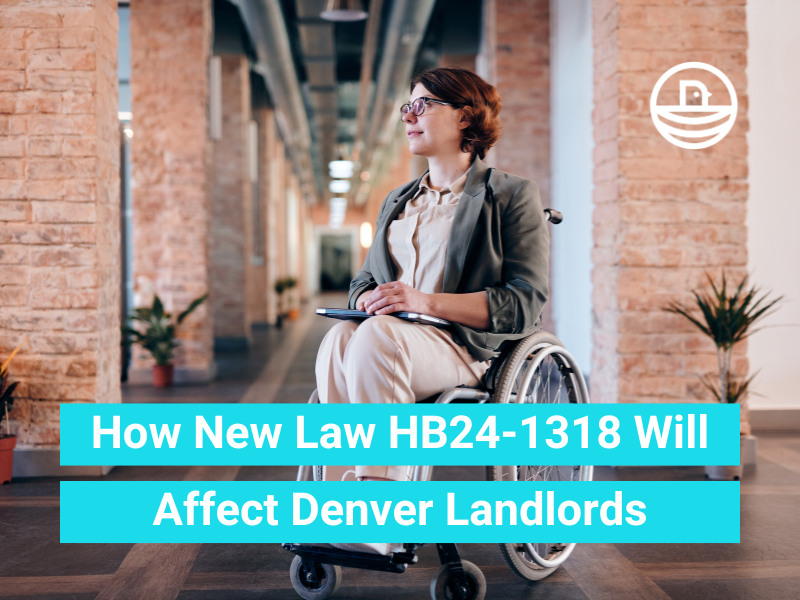Beyond Denver’s easy access to nature and thriving economy, many people choose to live in the Mile High City because of its dedication to human rights. One such example can be found in Colorado law HB24-1318, also called the Modify Rental Premises Person with Disability law.
One in four U.S. adults experiences disability, so understanding this law is critical for all Denver rental property owners. Whether you’re a Colorado landlord or an investor, HB24-1318 impacts your financial liability by changing the scope of responsibility when considering disability modifications. The penalty for mishandling these requests can cost up to $23,100, which means Colorado landlords can’t afford to miss this legislative update.
Evernest is here to help you understand HB24-1318, how to assess reasonableness regarding disability modifications, and the effect it will have on your rental property portfolio.
New Colorado Law HB24-1318
Before HB24-1318, Denver landlords were responsible for following the Department of Housing and Urban Development’s (HUD) disability modifications rules. HUD is fueled by the Fair Housing Act, which forbids discriminating against renters with disabilities among six other protected classes nationally. In short, a Colorado rental property owner couldn’t refuse to rent to people with disabilities, charge them additional fees, or refuse reasonable modifications.
Reasonable modifications to rental property are protected under the Americans With Disabilities Act (ADA). However, the financial liability of those modifications fell to the tenant before HB24-1318. Prior to this new law, a Colorado landlord could mandate the tenant pay for the initial change and revert any disability modifications upon move out.
Now, HB24-1318 says Denver investors can’t require tenants to pay for disability modifications, nor can you require them to pay to restore the rental property to its pre-modification condition. Though this new law came into effect on August 7, 2024, HB24-1318 will primarily impact Colorado landlords resigning leases or placing new tenants in 2025.
Requests for Rental Property Disability Modifications
All tenants with disabilities can make modifications requests. To avoid a Fair Housing Act violation, Denver landlords should follow the disability modifications process listed here:
Request: The renter or someone acting on their behalf will ask for a modification.There must be a connection between the requested change and the person’s disability. If the connection isn’t obvious, ask your rental property lawyer about requesting documentation from the tenant’s doctor or medical team. Tell the tenant that you appreciate their request, then explain that you’ll reach out with next steps by a specific date. If something stops you from meeting the expectation you set, tell your tenant right away.
Investigation: As a Denver landlord, you need to examine each request thoughtfully. Consider the cost and whether the disability modifications would change your business. Secure at least three quotes for the cost of work. If the request isn’t cost-prohibitive, fantastic! If it is more than you can afford, look into more cost-effective alternatives.
Implementation: Once you know if you can move forward with the original request or need to pitch more affordable options, have another conversation with your tenant. Either plan the logistics of implementation, like scheduling, or determine if your more affordable disability modifications suit your tenant’s needs. If the renter’s request exceeds your financial capacity as a rental property investor and your suggested alternative is dismissed, you may have legal recourse to deny that the requested changes are “reasonable.” Be sure to ask your attorney and the Denver HUD housing authority about your unique situation as needed.
Bear in mind that the Fair Housing Act forbids landlords from discriminating against tenants based on disabilities - so if a prospective tenant is financially eligible for your rental property, you must consider them as you would any other tenant.
What Types of Disability Modifications Are Considered Reasonable?
There are a plethora of potential disability modifications that could be reasonable for a rental property. These requests can be made at any time, though most occur either before the renter has moved in or after the tenant suffers a disability-inducing accident.
Though not a complete list, HUD offers the following as common disability modifications:
“Widening doorways to make rooms more accessible for people in wheelchairs
Installing grab bars in bathrooms
Lowering kitchen cabinets to a height suitable for people in wheelchairs
Adding a ramp to make a primary entrance accessible for people in wheelchairs
Altering a walkway to provide access to a public or common use area”
Benefits for Denver Landlords
.png)
Though disability modifications may require an initial capital investment, they boost the long-term value and appeal of your rental property by becoming featured amenities. Make sure to add pictures of these changes to your listing the next time you’re looking for tenants, and your rental will have greater appeal to people with disabilities and senior citizens - all of whom can make wonderful long-term renters.
Conclusion
If managing disability modifications for your Denver rental property sounds like a ton of work, you’re not alone! Maintaining legal compliance in the ever-shifting rental landscape can be hard. That’s why savvy investors work with Evernest, a professional property management company.
Our property managers will make sure your lease agreements are bulletproof, assist your tenants, and handle any requests that pop up with our network of vetted and insured vendors.


